The May 29, 2020, episode of CounterSpin featured archival interviews about police racism with Alex Vitale (originally aired 10/27/17), Chase Madar (10/23/15) and Shahid Buttar (9/9/16). This is a lightly edited transcript.
<a href=”https://www.fair.org/audio/counterspin/CounterSpin200529.mp3″><strong>MP3 Link</strong></a>
New York Times (5/26/20)
Janine Jackson: This week on CounterSpin: The May 26 New York Times reports that authorities are looking into “the arrest of a black man who died after being handcuffed and pinned to the ground by an officer’s knee.” Police murder yet another black person in broad daylight, and the Times can’t bring itself to use active verbs.
George Floyd was killed by a police officer who remained on the force despite a record of violence and complaints, his murder was covered up as a “medical incident” by the police department, and, when people protested the killing, police tear-gassed and shot at them with rubber bullets. Now law enforcement will investigate law enforcement.
Seeing all of this, again, more people are coming to consider that racist policing cannot be “reformed” with an occasional lawsuit and some implicit-bias classes. CounterSpin has had unfortunate occasion to discuss the issue many times. We talked about the history of policing with professor and author Alex Vitale. We’ll hear some of that conversation today.
Many hold out hope for justice from the courts for police crimes. We talked about the problems with that path with civil rights attorney and author Chase Madar. We’ll revisit that as well.
And: Without the bystander video, we’d only have the police version of George Floyd’s death. We wouldn’t know he said he couldn’t breathe, that multiple people pleaded with the cops to stop what they were doing. The New York Times calls that “video raising questions about the police narrative”; actually, it’s communities desperate to be believed when they say law enforcement doesn’t value their lives, using one of the few tools left to them. We talked about supporting these critical witnesses with Shahid Buttar, then-director of grassroots advocacy at the Electronic Frontier Foundation.
That’s all coming up this week on CounterSpin. CounterSpin’s brought to you each week by the media watch group FAIR.
***
Janine Jackson: The litany of instances of police violence and misconduct is both infuriating and almost numbing. Our guest’s new book suggests we reconsider our understanding of policing, see it less as a tool that has on some occasions been used for abuse, and more as a tool for abuse, a system that does considerable harm even when functioning as designed. That reflects more closely the history of the institution in this country, and it’s really only seeing things that radically—going to the root—that lets us see a way out; not a way back to some imagined time in which there was harmony between police and community everywhere, but forward to a time in which policies of punishment don’t distort so many societal functions, and consign huge numbers of, especially, black and brown people to the margins.
The book is called The End of Policing; author Alex Vitale is professor of sociology and coordinator of the Policing and Social Justice Project at Brooklyn College. He joins us now by phone. Welcome back to CounterSpin, Alex Vitale.
Alex Vitale: Thank you.
JJ: People are offended, I think morally, when you suggest that the inequity of the impact of policing is not a bug but a feature. I think we tend to think of it as an institution made in a lab, you know: We need protection from criminals, so let’s create “law enforcement.” I wonder if you would tell us a little bit of the actual history of US policing, that shapes the role that we see it playing today.
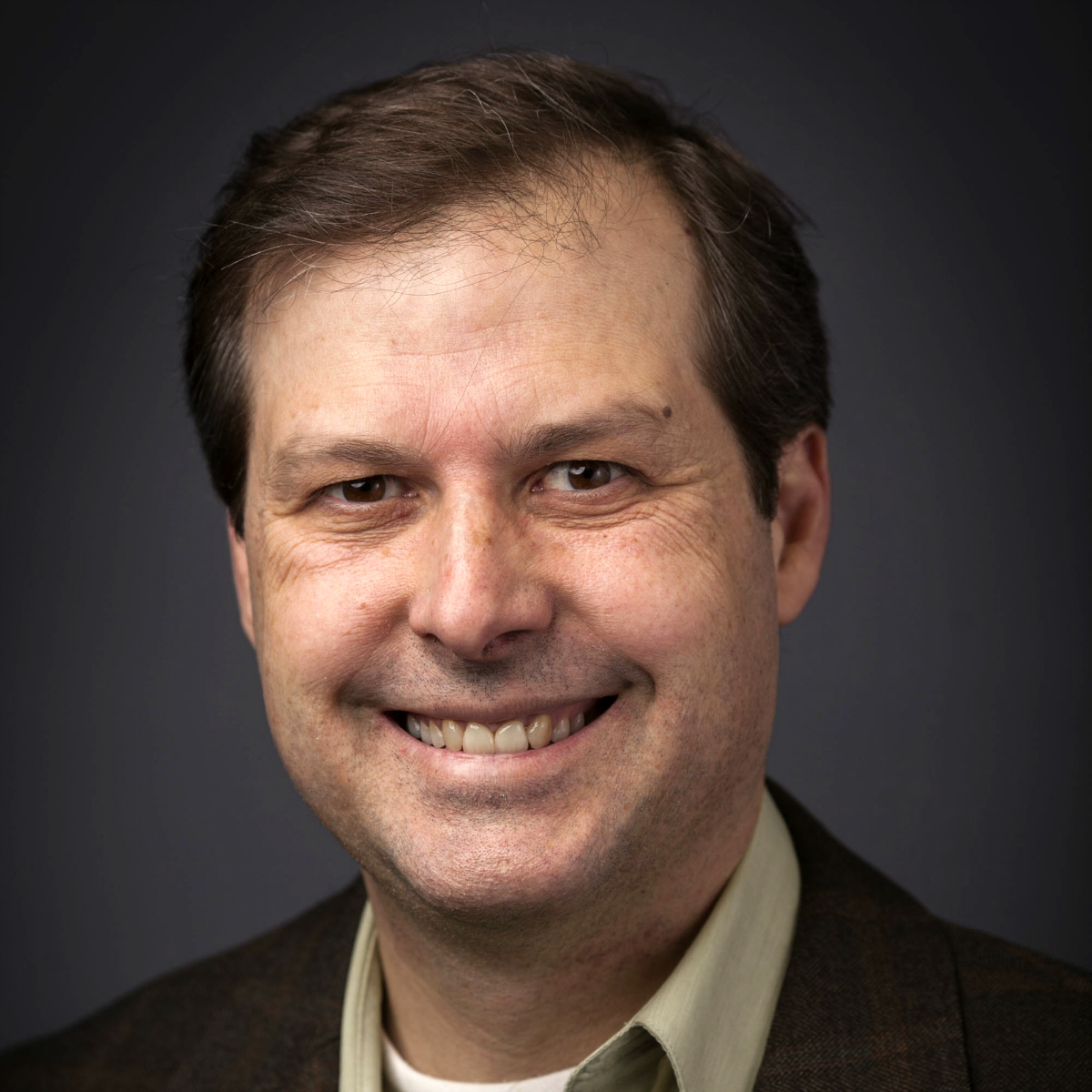
Alex Vitale: “If we embrace supposed reforms to policing that just re-empower the police, and relegitimize the police, without really addressing the negative consequences of what they’re doing, then we haven’t really accomplished anything.”
AV: Sure. There’s a standard liberal narrative, academic narrative, historical narrative, about the police that begins with the London Metropolitan Police formed in 1829. And the idea that’s propagated behind it, is that it was an improvement over the kind of semi-professional watch, that was made up of volunteers and others pressed into service, that would walk around at night, on the one hand, and the use of the militia to put down riots and disorder, on the other hand. And the feeling was that this would be a civilian force under the control of local authorities, and would engage in a kind of neutral enforcement of the law.
But the reality is, is that the model for the London Metropolitan Police actually is directly tied to the British occupation of Ireland. And the person who creates the London police, Robert Peel—Robert, Bob, the Bobbies—had been in charge of the British occupation of Ireland, and it was there that he begins to develop the idea of a civilian force that could be used to put down rural uprisings more efficiently than relying on the British army, which would have been tied up in the Napoleonic Wars, was overstretched and highly indebted. So he creates the Irish Peace Preservation Force, which is located in local communities, which allows for better surveillance and preemptive action to put down social unrest.
London, during this period, is awash in this newly industrializing working class that’s come from rural areas, and the job of the police was to micromanage the lives of this new industrial urban workforce, in a way that tried to mold them into a reliable workforce. So there were all kinds of little minor nuisance laws that were enforced, as well as proscriptions on, you know, drunk and disorderly behavior, etc., that had the purpose of getting people to go home to their families, get up in the morning and go to work and be productive, and to try to stamp out lifestyles that weren’t tied to a standard industrial work life. At the same time, they put down riots, they put down labor movements, they attacked strikers, etc.
And we can see this in the US context as well, with the creation of forces to drive Native American populations out, to drive out Mexicans from what was becoming Texas at the time, to stamp out workers movements, to shoot miners in Pennsylvania, etc. And so the book basically argues that the origins of policing should be understood as intimately tied to three major forms of accumulation during the 19th century, and these are slavery, colonialism and the new industrial workforce.
JJ: The definition of crime itself has been very much shaped by the social control impetus of the enterprise of policing.
AV: It was a new way of constructing state power that was more fine-tuned than relying on the army and the militia. It was able to produce legitimacy for the state in a way that the army was not; it relied on brute power. And so this was much more efficient for the state.
And the state immediately began on this kind of mythmaking, of saying that, well, of course we understand the state is legitimate, because these are liberal democracies of some form, and therefore any expression of state power is legitimate. But all of that discourse completely hides slavery, completely hides the suppression of workers’ movements, and so the actual tasks of this seemingly legitimate state are in fact designed to reproduce race and class inequalities, and the police are just a softer touch in carrying out that mission.
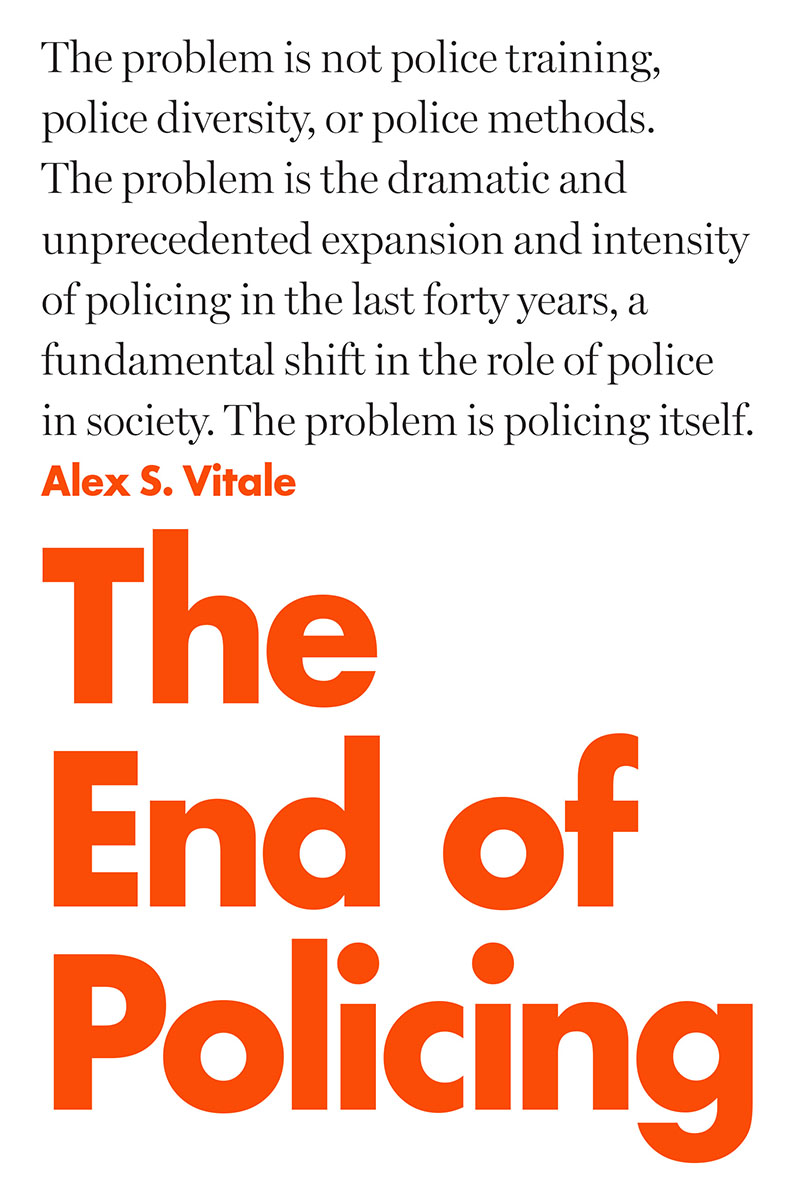
Verso (2017)
JJ: So what are some of the alternatives to policing that the book is getting at?
AV: What I do is I take eight areas of policing, and look at the origins of that kind of policing, what the problem is it claims to be trying to solve, and then look at the literature that shows just how many problems that kind of policing actually produces, rather than resolves, and then try to lay out a series of alternatives to relying on police.
So we don’t need nicer school police, we don’t need better-trained school police. The whole idea of school policing is deeply flawed. All the research shows that it doesn’t make young people any safer, it contributes to an environment of insecurity for young people; it’s also often demeaning, degrading, abusive and at times even deadly to these young people.
There are alternatives to relying on police to deal with discipline issues in schools. And there are schools that are using these methods, like restorative justice programs, where the whole school is oriented, not towards driving people out of school and into the criminal justice system, but in trying to actually resolve problems. And they use various forms of peer mediation, peer adjudication.
We could look at a community schools model that’s being tried out in some areas, where the school is seen as a resource center for the whole community, so that after hours, on the weekends, there are classes and services available to the families of students. So that if there is a mental health issue, if there is an English-as-a-second-language problem that maybe is contributing to financial insecurity, if there are nutrition issues, health issues, the school could be seen as a resource for that, rather than just another place where young people are criminalized.
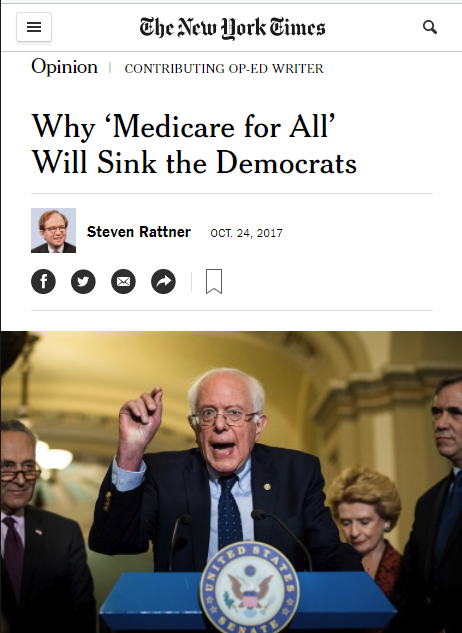
New York Times (10/24/17)
JJ: Many would say it’s time for a bold vision. I’m reminded, though, of an op-ed I just saw a few days ago, saying that calling for universal healthcare is going to re-elect Donald Trump. It seems like people who want things really to change are seen as antagonists, not just of conservatives or the right wing, but of many people who define themselves as centrists. You get this feeling of, oh, we also want this social change that you’re calling for, but if you really push for it, well, then you’re to blame for anything that happens. It’s hard not to hear a kind of “go slow, go slow,” which, I just wonder, that seems something we have to fight against as well. Bold ideas require courage, and not least the courage to hold one another up when we’re being attacked as being somehow the real reason that we can’t see any change.
AV: Well, I have two thoughts on that. One is that if we embrace supposed reforms to policing that just re-empower the police, and relegitimize the police, without really addressing the negative consequences of what they’re doing, then we haven’t really accomplished anything, and we’ve actually maybe made things worse.
The other is that policing is overwhelmingly a local concern, and the vast majority of policing happens in major urban areas, the majority of which are run by Democrats. And so we should not be paralyzed about broader national political trends in trying to do something about this. Wherever you’re listening to this, there are local politicians who are empowering the police to be a coercive force, in a way that lets them off the hook from engaging in real problem-solving that will produce real justice for people, and we can do something about that, wherever we are.
***
Janine Jackson: When the Cuyahoga County prosecutor released two reports asserting that Cleveland police officers acted reasonably in shooting a 12-year-old boy holding an air pistol within seconds of arriving on the scene, it was seen by many as preparing the public for the fact that the prosecutor would not be strenuously pursuing indictment of the officers before the grand jury.
And for many, that’s depressing, but not terribly surprising. There are some who believe law enforcement don’t make mistakes, or any mistakes they make should be overlooked, because they have a hard job. Those that don’t share that view look to the legal system to bring justice when police officers fail, but every day brings evidence that that faith is misplaced, that the mechanisms that in theory should serve as checks on police power either exist in theory more than in practice, or don’t exist at all.
How can those outraged by police violence turn anger into change? Here to discuss the issue is Chase Madar; he’s a civil rights attorney and the author of the book The Passion of Chelsea Manning. Welcome to CounterSpin, Chase Madar.
Chase Madar: Great to be talking with you.
JJ: The fatal shooting of Tamir Rice by Officer Timothy Loehmann was heartbreaking. It didn’t come out of the blue, though. The Cleveland Police Department has already been cited by the Justice Department for excessive force, for which officers are rarely disciplined. A 2013 investigation by the state attorney general found “systemic failure,” that was their term, systemic failure in the department. There’s just a lot of wrong in this story, from the failure to vet Loehmann, who had a terrible record, to the harassment of Rice’s family; it’s staggering.
But now all the attention is on the prosecutor and the grand jury, as if some measure of justice will come from that process. But the law on police shootings just doesn’t work the way that people might imagine it does, does it?
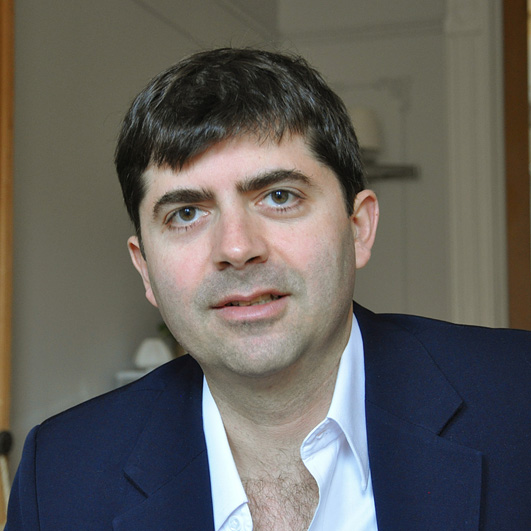
Chase Madar: “The laws as they actually exist in the United States, not as we wish they might be, but as they actually exist, are incredibly deferential to police officers using lethal violence.”
CM: No, it doesn’t, and it’s important to face that head-on from the very beginning. I think there is a very hard-wired tendency among Americans in general, and liberals in particular, to think that even when things are going wrong, that the law is good and fundamentally on our side, that the law is synonymous with justice.
And people like to think this, whether it’s regarding the dysfunction of our financial system, that it must be the result of crime rather than the ordinary workings of our financial laws. People think that anything that goes wrong in wartime must be a crime, even though the laws of war are incredibly permissive, really have the function of licensing acts of lethal violence, more than restraining it.
And this goes double, triple, quadruple for police violence. In fact, the laws as they actually exist in the United States, not as we wish they might be, but as they actually exist, are incredibly deferential to police officers using lethal violence. And this is not just a matter of local aberrations in places like Ferguson, Missouri, or Staten Island; the laws really shielding police violence from accountability—that goes all the way up to the Supreme Court, and it’s a part of Supreme Court jurisprudence that police can really fire with a great degree of latitude.
JJ: What is that legal underpinning? There’s something called “objective reasonableness” that seems to get to the heart of the actual standard in play when police kill somebody.
CM: In the 1985 landmark US Supreme Court case of Tennessee v. Garner, the Court set up an “objectively reasonable” standard for whether or not a police officer can use lethal force. And, of course, this sounds wonderful; what could be better, an objectively reasonable standard? You got to be objective, that’s good; and reasonable, who could be against that?
But the way this has worked out in actual practice in courts, including the Supreme Court in subsequent decisions about police violence, is that it is incredibly deferential to police officers; it’s really what seemed objectively reasonable to the police officer at that moment, without any second-guessing being allowed, without any hindsight being allowed, and it’s more of a subjectively reasonable test.
Now, there are limits; I don’t want to say that absolutely anything goes. But if there’s any conceivable way to justify what a police officer has done, it’s probably going to hold up in court. And those of us who know the law were therefore not so surprised by the no bill of indictment handed down for the police shooting of Michael Brown in Ferguson, or by the police strangulation of Eric Garner in Staten Island, which also came up with a no bill of indictment in the grand jury. And what I mean by that is, these cases were not even brought to trial; they were deemed by the grand jury to be not trial-worthy, not strong enough.
Looking at the other mechanisms where you think you might be able to restrain police violence, or control and regulate the police use of violence, they usually come up empty-handed too. You might think that suing a police department, OK, while it doesn’t result in a criminal conviction or prison sentence for police officers, shouldn’t that install good behavior or better behavior, shouldn’t that incentivize good behavior? Surely the financial hit of a big multi-million dollar payout will set up a new incentive structure, and will deter bad behavior in the future. It makes common sense, but it turns out to be all wrong.
In fact, the payouts that police departments routinely give out, especially in big cities, that money does not come from police department budgets at all; it comes from, usually, a general city budget. The individual police officer at fault doesn’t have to pay any money himself or herself. And in New York City, even if there’s a successful suit against a police officer, I was told by Ron Kuby, a veteran civil rights litigator who sues the police routinely, that the report of this lawsuit won’t even be put in a police officer’s permanent record, or in his or her file.
JJ: Ultimately the taxpayer is paying for —
CM: Yes, ultimately it’s the taxpayer; that’s the cruel irony of this.
JJ: I think people want police who kill people who pose no threat to them to go to jail, just like criminal bankers—not because they think jail fixes everything; I think it’s the double standard that galls, the “one law for me, another for thee.” We have people doing life without parole for marijuana offenses. But if we want institutional change, how far would even criminal prosecutions go toward achieving that?
CM: They should be used, and they should even result in convictions sometimes. But if we want real institutional change, then I think we’re going to have to have a different focus, and a broader focus than that. Because criminal prosecutions, using that as the spear tip, really doesn’t seem to work to reform police departments, to change police behavior. And I think when it comes to reforming police departments and police behavior, it’s either go big, and look at the really big picture, or just—that’s just the only way. Or nothing.
***
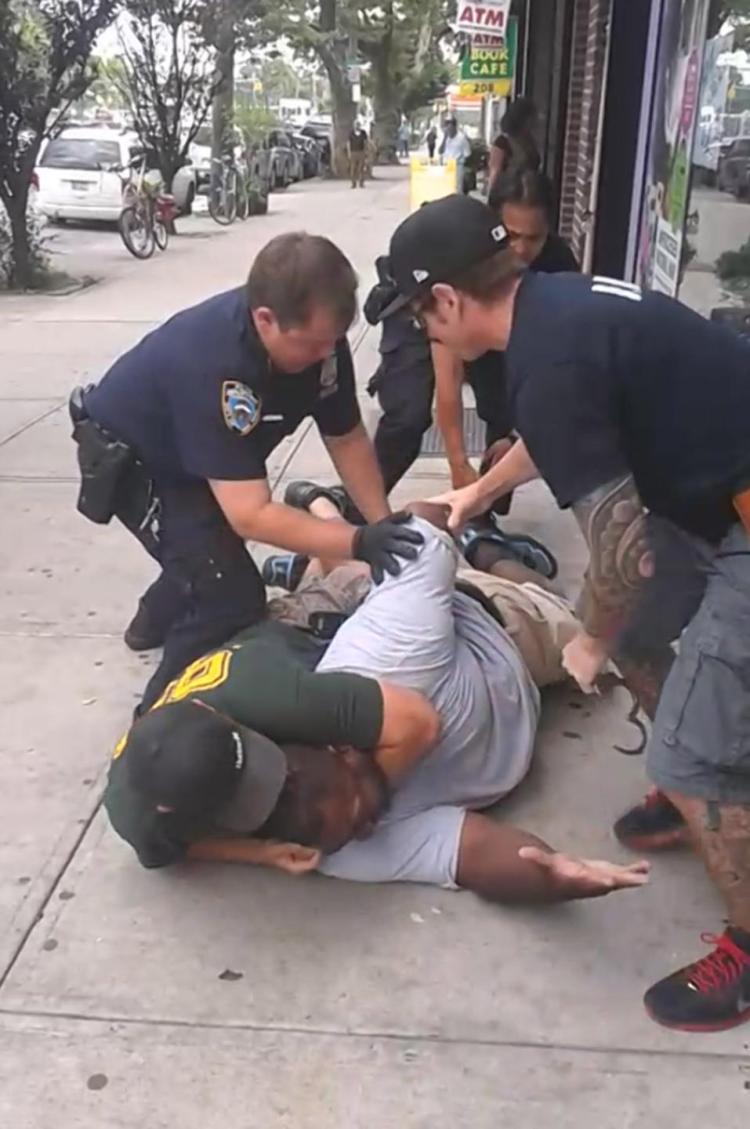
Ramsey Orta’s video showed NYPD Officer Daniel Pantaleo using a fatal—and illegal—chokehold on Eric Garner.
Janine Jackson: If the expression “I can’t breathe” holds power for you, it’s because of Ramsey Orta. He’s the one who held his cellphone camera steady while New York police Officer Daniel Pantaleo choked the life out of Eric Garner in July of 2014.
Garner was Orta’s friend. He used to give Orta’s daughter a dollar to spend at the local store every time they walked past. Ramsey Orta’s been sentenced to four years in prison, stemming from drug and weapon charges, those that stuck among the many and various police have brought against him since the Garner video came to light.
Chris Leday uploaded video of Alton Sterling’s killing at the hands of Baton Rouge police. Reporting to work the next day, he was arrested, handcuffed and shackled by civilian and military officers. First he “fit a description,” then it was assault charges that didn’t exist; finally, it was unpaid traffic tickets.
Diamond Reynolds, who filmed the killing of her partner, Philando Castile: handcuffed and held in jail for eight hours, separately from her four-year-old daughter.
If you’re seeing a frightening pattern here, you’re doing more than most mainstream journalists. The targeting of citizen journalists for retaliation by law enforcement would present concerns enough for freedom of speech, and for the rights of communities to maintain their own safety, were it not matched with a disheartening absence of support from a media establishment that has premised thousands of stories on their world-changing work.
Joining us now to talk about what protections exist for civilian journalists, and what more may be needed, is Shahid Buttar. He’s director of grassroots advocacy at the Electronic Frontier Foundation. He joins us now by phone from San Francisco. Welcome back to CounterSpin, Shahid Buttar.
Shahid Buttar: Thank you so much for having me, Janine.
JJ: The expression “kill the messenger” comes to mind, or at least fail to support, much less celebrate, the messenger, to the extent that they’re not sure they’d do the same thing again. First of all, regular people who film police actions are on the right side of the law as it exists, aren’t they?
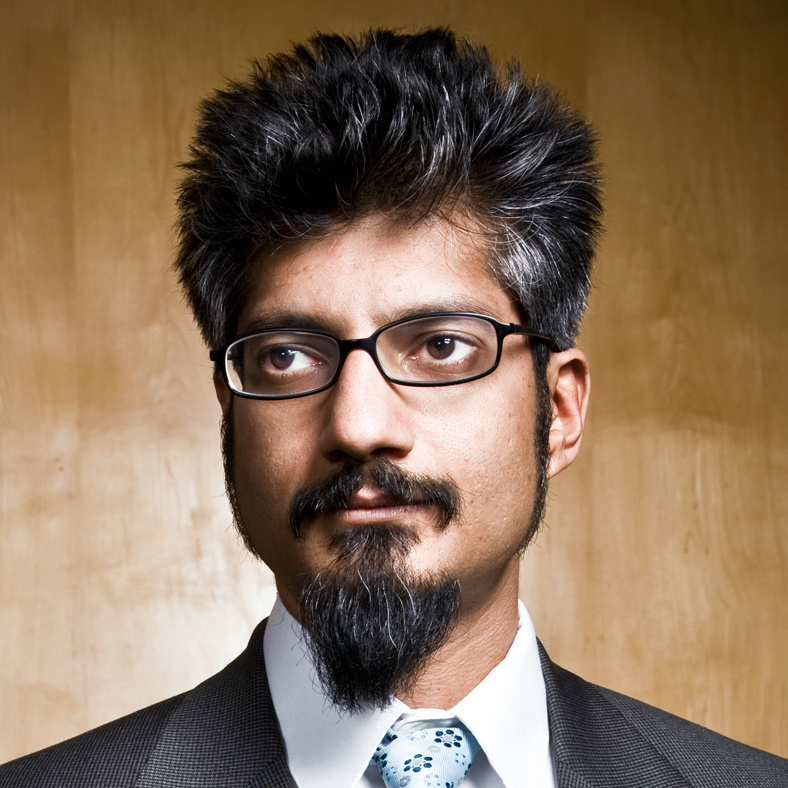
Shahid Buttar: “What we’re talking about is criminalizing transparency to protect illegitimate uses of power. And that, of course, is what the Constitution is supposed to stop.”
SB: Absolutely. The First Amendment unambiguously protects the right to observe and record police activities. And the failure of police departments and agents and officers around the country to respect those rights, and, similarly, the failure of the journalistic profession, I think, generally to stand in solidarity with those rights—that is to say, the right of the press, which does not make a distinction between professional and grassroots journalists—is alarming.
And I think this is one of the places where the rubber hits the road, in terms of the words in the Constitution and the rights they aim to protect, that being the rubber hitting the road of social practice, and in this case, public safety agencies that perceive any threat to their own political power as analogous to a threat to public safety.
And that, of course, precisely gets the relationship wrong, because the people who are capturing police violence on video, they are the ones enhancing public safety here, as well as standing behind very well-settled law, that unfortunately the agencies, and unfortunately a lot of journalists, choose to disregard.
JJ: It isn’t as if we’re talking about a mere legal abstraction. Of course, the context is we’re talking about vulnerable people and communities who have this almost accidentally democratic tool, or technology, that they can use to get some hope of awareness for things that they’ve lived with forever.
And that brings me to the journalistic point. Activist and writer Josmar Trujillo wrote that these copwatchers are not only willing and able to do work that reporters, mainstream reporters, either won’t or to some degree can’t do. They’re looking at issues of policing that impact communities of color the most. And it matters that they are oftentimes of these communities, they have also insights that matter.
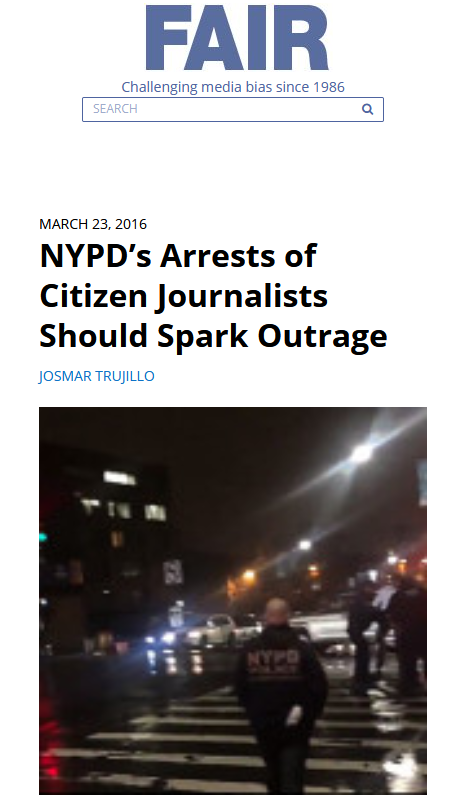
FAIR.org (3/23/16)
And what Josmar was saying was, it’s not enough to simply say they should be allowed to film; we really do have to be outraged collectively when they are harassed. And he made the point that for an individual cop watcher, having police arrest you and take your phone and erase your footage, it’s like if you raided the offices of CNN, and destroyed their files and their equipment, and we should see a commensurate response from journalists.
SB: I absolutely agree. I mean, the journalistic profession has been taking it on the chin at the hands of the government for decades. And to watch the ranks of journalists fail to internalize that attack is disappointing.
I go back to the Justice Department, monitoring the cell phones of AP journalists in Washington, right? Or the repeated attempts to force reporters to divulge their sources in the context of investigations of national security leaks. Or, for that matter, the vilification of whistleblowers, which is no different.
Across all of these contexts, what we’re talking about is criminalizing transparency to protect illegitimate uses of power. And that, of course, is what the Constitution is supposed to stop, right? We’re supposed to be committed as a country to transparency, and to reining in arbitrary power, but we actually, in each of these situations, whether it’s criminalizing and persecuting whistleblowers for revealing fraud, waste and abuse or lies by executive officials, or whether it’s jailing grassroots journalists who are recording the police departments in their communities using arbitrary violence to, in some cases, kill people, extrajudicially, without ever proving guilt of any offense at all, let alone a serious one—and I’ll just throw in an added gloss here—this is at the same time, mind you, that senior executive officials do lie about grave issues of global importance, and get away with it.
***
Janine Jackson: That was Shahid Buttar. Before him, you heard Chase Madar and Alex Vitale.
PrintCounterSpin | Radio Free (2020-06-03T22:20:43+00:00) ‘The People Capturing Police Violence on Video Are the Ones Enhancing Public Safety’ – CounterSpin interviews with Alex Vitale, Chase Madar and Shahid Buttar on racist policing. Retrieved from https://www.radiofree.org/2020/06/03/the-people-capturing-police-violence-on-video-are-the-ones-enhancing-public-safety-counterspin-interviews-with-alex-vitale-chase-madar-and-shahid-buttar-on-racist-policing/
Please log in to upload a file.
There are no updates yet.
Click the Upload button above to add an update.
